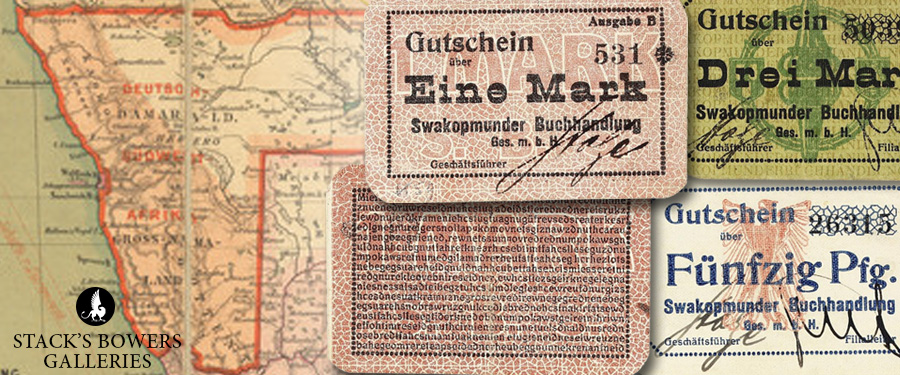
By now, many of our customers will have had a chance to look at the catalog for the Spring 2025 Maastricht Auction. Among the highlights from around the world found in the catalog, a group of small vouchers caught my eye. Part of the Al Kugel Collection, they were issued by the ’Swakopmunder Buchhandlung’ (Swakopmund Book Store) in German Southwest Africa during World War I, after the German colony was occupied by British forces. The sale offers three lots (50221, 50222, and 50223) that comprise a total of 13 different examples of this emergency issue. In this blog, we will take a brief look at these small pieces of cardboard, that were a temporary measure to provide circulating currency in a time of crisis.
Germany, established as a nation only in 1871 following the Franco-Prussian War, was a relative latecomer to colonialism. German Southwest Africa, established in 1884, was Germany’s first major colonial holding and a key step in its pursuit of imperial power. Motivated by national prestige and a desire to compete with other European empires, Germany sought overseas territories that could boost its economic standing. The protectorate was founded after German merchant Adolf Lüderitz secured land along the Atlantic coast in southern Africa in 1882, prompting official government recognition two years later, along with military support. Once established, the colony attracted settlers and investment, in the hopes of developing mining operations, commercial agriculture, and new markets for German goods. German Southwest Africa quickly became central to the empire’s vision of an economically self-sustaining colonial system.
Established in 1900 by German colonist Emil Höhne, the Swakopmunder Buchhandlung served as a key commercial institution in German Southwest Africa, playing a small part in the colonial community’s efforts to recreate familiar aspects of German life abroad. Located in the coastal town of Swakopmund, about 200 miles from the colony’s capital, Windhoek, the bookshop offered a range of German-language literature, newspapers, and educational materials. It catered primarily to the German community of settlers, administrators, and missionaries. Additionally, it also functioned as a publisher and printing house, distributing official documents and printed materials that supported the colonial administration.
After British troops from South Africa occupied the German Colony in 1914, they soon invalidated all German currency in circulation. This led to an immediate and chronic shortage of circulating currency. In April 1916 the Windhoek Merchants’ Association found a solution by having small Gutscheine (vouchers) printed by the Swakopmunder Buchhandlung. The notes, printed on various colors and types of cardboard, circulated widely and brought economic relief to the local community. The notes were signed by Heinrich Stolze (who, with Hans Peters, had taken over the bookstore a few years earlier) along with the signature of a local branch manager. The notes entered circulation in August 1916 and circulated for about two years until the British finally banned them.
Thirteen different issues are listed in the Pick catalog, although varieties exist, and an unissued 1917 10 Mark is also listed in the Banknote Book. The higher denominations are generally considered the scarcest, although there are some deceptively scarce varieties in the lower denominations as well. The most curious issue is Pick-14 (included in lot 50221), the 1 Mark of Series B printed on red-brown paper. On the back of that type appears to be a gibberish of random letters. However, when read from right to left and with proper punctuation added, a full paragraph gives the background of these issues and the reasons for their issuance. The entire text and English translation can be found in the Banknote Book. It includes the sentence “we hope to have done a good service to our countrymen and especially to the merchant community…may it later receive the recognition it deserves.”
The Swakopmunder Buchhandlung series of emergency currency is an important remnant of a turbulent time in the region’s history. Perhaps the most interesting fact is that the bookstore remains open for business to this day and still offers German-language books to its clientele in Namibia. It stands as perhaps the most enduring legacy of Germany in Africa, more than a century after the empire lost its colonial possessions. These emergency issues, while rare in high grades, remain relatively affordable, and while there are scarce varieties, a complete type set can be put together with some patience for surprisingly low cost. We hope these lots from the Al Kugel Collection in the Maastricht auction, along with others in our upcoming May World Paper Money auction, inspire collectors to start collecting this fascinating series of emergency issues.





